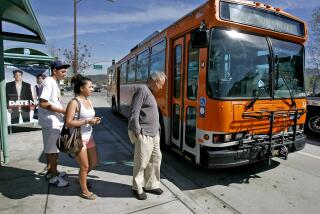Commuters Jog, Hitchhike in London Walkout : Transport Strike Tests British Ingenuity
- Share via
LONDON — The worst disruption in more than 60 years hit London’s public transport system Monday, and commuters sought to cope by jogging, cycling and hitchhiking to work in the best stiff-upper-lip tradition.
A one-day strike idled all but 11 of the 400 subway trains that serve the capital, and all but a handful of its 4,700 double-deck buses. Together, the two systems normally carry about 3 million commuters a day.
About one out of six trains serving British Rail’s southern region were canceled as engineers refused to work overtime. This caused more delays for commuters who normally travel to the city’s outskirts by railway.
The subway shutdown was the third one-day wildcat strike in a month by drivers demanding a $105 increase to $400 a week for operating trains without guards.
The bus strike was described as the first of what will be biweekly one-day warning strikes in support of a demand for a 14% wage increase, double the government’s latest offer.
The combined walkout was said to be the worst combination of British transportation disputes since the nationwide general strike of 1926.
The walkout forced many commuters to use their automobiles, but the resulting chaos on London’s archaic and overburdened streets was not as bad as some had feared.
“It’s been quite good this morning, comparatively speaking,” said Nick Simmon, a spokesman for the Automobile Assn.
Most people, he said, apparently heeded public warnings to drive only if necessary and to allow plenty of extra time.
Taxis were in heavy demand, and many commuters felt fortunate to find one for at least a part of their journey. Hundreds lined up at taxi stands outside the city’s main railroad terminals.
Some London firms provided buses to move their employees from train stations to their offices. Others released their personnel last Friday with work they could do at home on Monday. Some paid the equivalent of $160 to put up key employees at London hotels.
“I could not cope with trying to get into London,” one executive told Independent Television News at a downtown hotel.
The London Chamber of Commerce & Industry said that about 90% of the people who work in the city showed up eventually, though many reported late.
People who live near the Thames commuted by ferry. Some bankers, stockbrokers, and insurance specialists walked four miles or more to their jobs in The City, London’s financial district.
More to Read
Sign up for Essential California
The most important California stories and recommendations in your inbox every morning.
You may occasionally receive promotional content from the Los Angeles Times.













